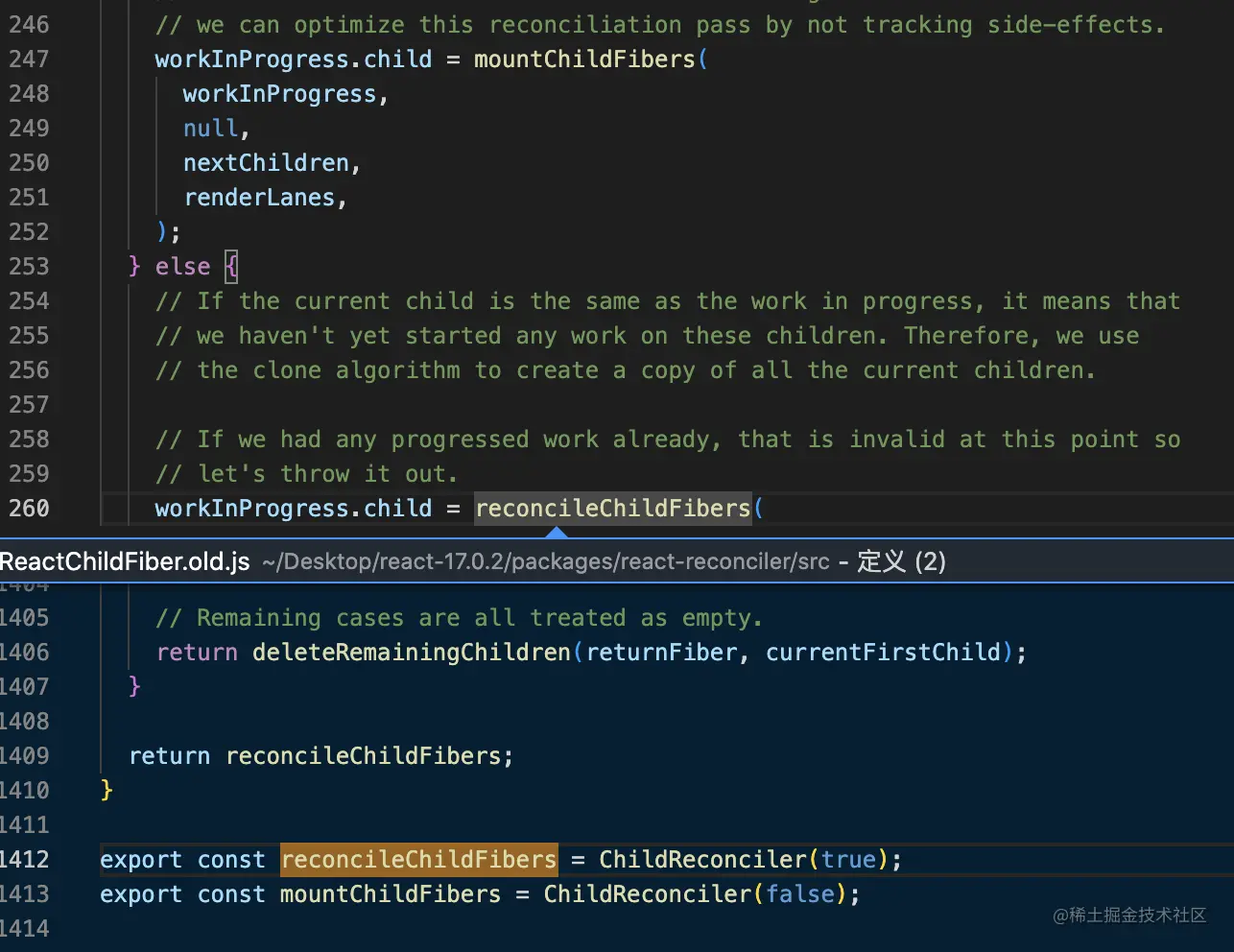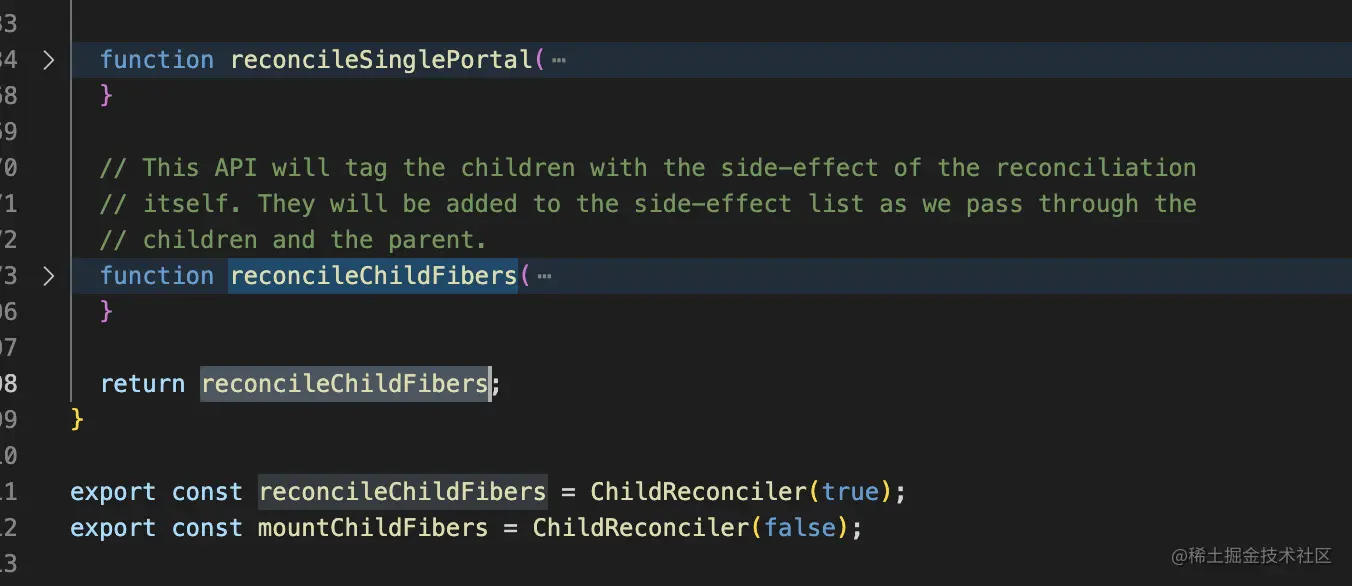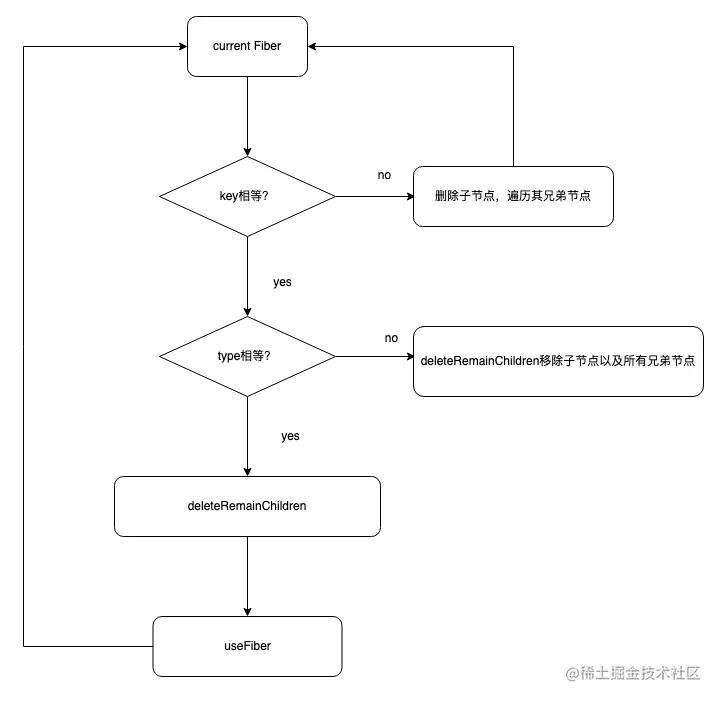reconcileChildren
dom diff的入口函数就是reconcileChildren,那么他的源码如下:
//packages/react-reconciler/src/ReactFiberBeginWork.old.js
export function reconcileChildren(
current: Fiber | null,//当前的fiber节点
workInProgress: Fiber,// 新生成的fiber
nextChildren: any,// 新生成的reactElement内容
renderLanes: Lanes,//渲染优先级
) {
if (current === null) {
// 如果没有已经渲染的fiber树,则直接把reactElement内容渲染上去
// If this is a fresh new component that hasn't been rendered yet, we
// won't update its child set by applying minimal side-effects. Instead,
// we will add them all to the child before it gets rendered. That means
// we can optimize this reconciliation pass by not tracking side-effects.
workInProgress.child = mountChildFibers(
workInProgress,
null,
nextChildren,
renderLanes,
);
} else {
// If the current child is the same as the work in progress, it means that
// we haven't yet started any work on these children. Therefore, we use
// the clone algorithm to create a copy of all the current children.
// If we had any progressed work already, that is invalid at this point so
// let's throw it out.
workInProgress.child = reconcileChildFibers(
workInProgress,
current.child,
nextChildren,
renderLanes,
);
}
}
复制代码reconcileChildren的源码并不长,主要做了两件事
- 如果是首次渲染,则会把已经处理好的
fiber树进行挂载。 - 如果不是首次渲染则调用
reconcileChildFibers进行下一步处理。
我们关注一下mountChildFibers和reconcileChildFibers,我们发现这两个函数分别指向ChildReconciler,只是mountChildFibers的参数为false,reconcileChildFibers的参数为true。我们在这里先埋下一个点,看看这个参数对后期的流程有什么影响。
我们继续深入可以发现,ChildReconciler这个函数冰的执行返回了reconcileChildFibers,所以这便是reconcileChildren的核心功能代码所在了。
reconcileChildFibers
function reconcileChildFibers(
returnFiber: Fiber,
currentFirstChild: Fiber | null,
newChild: any,
lanes: Lanes,
): Fiber | null {
// This function is not recursive.
// If the top level item is an array, we treat it as a set of children,
// not as a fragment. Nested arrays on the other hand will be treated as
// fragment nodes. Recursion happens at the normal flow.
// Handle top level unkeyed fragments as if they were arrays.
// This leads to an ambiguity between <>{[...]}</> and <>...</>.
// We treat the ambiguous cases above the same.
const isUnkeyedTopLevelFragment =
typeof newChild === 'object' &&
newChild !== null &&
newChild.type === REACT_FRAGMENT_TYPE &&
newChild.key === null;
if (isUnkeyedTopLevelFragment) {
newChild = newChild.props.children;
}
// Handle object types
const isObject = typeof newChild === 'object' && newChild !== null;
// 处理对象类型
if (isObject) {
switch (newChild.$$typeof) {
// REACT_ELEMENT_TYPE类型
case REACT_ELEMENT_TYPE:
return placeSingleChild(
reconcileSingleElement(
returnFiber,
currentFirstChild,
newChild,
lanes,
),
);
// REACT_PORTAL_TYPE类型
case REACT_PORTAL_TYPE:
return placeSingleChild(
reconcileSinglePortal(
returnFiber,
currentFirstChild,
newChild,
lanes,
),
);
// REACT_LAZY_TYPE类型
case REACT_LAZY_TYPE:
if (enableLazyElements) {
const payload = newChild._payload;
const init = newChild._init;
// TODO: This function is supposed to be non-recursive.
return reconcileChildFibers(
returnFiber,
currentFirstChild,
init(payload),
lanes,
);
}
}
}
// 字符串与数字类型
if (typeof newChild === 'string' || typeof newChild === 'number') {
return placeSingleChild(
reconcileSingleTextNode(
returnFiber,
currentFirstChild,
'' + newChild,
lanes,
),
);
}
// 数组类型
if (isArray(newChild)) {
return reconcileChildrenArray(
returnFiber,
currentFirstChild,
newChild,
lanes,
);
}
// 可迭代的类型
if (getIteratorFn(newChild)) {
return reconcileChildrenIterator(
returnFiber,
currentFirstChild,
newChild,
lanes,
);
}
if (isObject) {
throwOnInvalidObjectType(returnFiber, newChild);
}
if (__DEV__) {
if (typeof newChild === 'function') {
warnOnFunctionType(returnFiber);
}
}
if (typeof newChild === 'undefined' && !isUnkeyedTopLevelFragment) {
// If the new child is undefined, and the return fiber is a composite
// component, throw an error. If Fiber return types are disabled,
// we already threw above.
switch (returnFiber.tag) {
case ClassComponent: {
if (__DEV__) {
const instance = returnFiber.stateNode;
if (instance.render._isMockFunction) {
// We allow auto-mocks to proceed as if they're returning null.
break;
}
}
}
// Intentionally fall through to the next case, which handles both
// functions and classes
// eslint-disable-next-lined no-fallthrough
case Block:
case FunctionComponent:
case ForwardRef:
case SimpleMemoComponent: {
invariant(
false,
'%s(...): Nothing was returned from render. This usually means a ' +
'return statement is missing. Or, to render nothing, ' +
'return null.',
getComponentName(returnFiber.type) || 'Component',
);
}
}
}
// Remaining cases are all treated as empty.
return deleteRemainingChildren(returnFiber, currentFirstChild);
}
复制代码reconcileChildFibers中我们根据入参newChild的类型分别对应着不同的处理:
- 当修改的内容为
REACT_ELEMENT_TYPE类型,调用reconcileSingleElement函数。 - 当修改的内容为
REACT_PORTAL_TYPE类型,调用reconcileSinglePortal函数。 - 当修改的内容为
REACT_LAZY_TYPE类型,递归调用reconcileChildFibers函数。 - 当修改的内容问
纯文本类型,调用reconcileSingleTextNode函数。 - 当修改的内容为
数组类型,调用reconcileChildrenArray函数。 - 当修改的内容为
可迭代类型,调用reconcileChildrenIterator函数
reconcileSingleElement
reconcileSingleElement的源码如下:
function reconcileSingleElement(
returnFiber: Fiber,// 父级
currentFirstChild: Fiber | null, // 父级下diff的第一个
element: ReactElement, // 当前元素
lanes: Lanes, // 优先级
): Fiber {
const key = element.key;
let child = currentFirstChild;
while (child !== null) {
// TODO: If key === null and child.key === null, then this only applies to
// the first item in the list.
if (child.key === key) {
switch (child.tag) {
// 如果为Fragment类型,并且key也相等
case Fragment: {
if (element.type === REACT_FRAGMENT_TYPE) {
// get后面的兄弟节点添加Deletion标记,用于dom删除
deleteRemainingChildren(returnFiber, child.sibling);
// 通过useFiber复用旧fiber与新的props
const existing = useFiber(child, element.props.children);
existing.return = returnFiber;
if (__DEV__) {
existing._debugSource = element._source;
existing._debugOwner = element._owner;
}
return existing;
}
break;
}
case Block:
if (enableBlocksAPI) {
let type = element.type;
if (type.$$typeof === REACT_LAZY_TYPE) {
type = resolveLazyType(type);
}
if (type.$$typeof === REACT_BLOCK_TYPE) {
// The new Block might not be initialized yet. We need to initialize
// it in case initializing it turns out it would match.
if (
((type: any): BlockComponent<any, any>)._render ===
(child.type: BlockComponent<any, any>)._render
) {
deleteRemainingChildren(returnFiber, child.sibling);
const existing = useFiber(child, element.props);
existing.type = type;
existing.return = returnFiber;
if (__DEV__) {
existing._debugSource = element._source;
existing._debugOwner = element._owner;
}
return existing;
}
}
}
// We intentionally fallthrough here if enableBlocksAPI is not on.
// eslint-disable-next-lined no-fallthrough
default: {
if (
// 新的ReactElement与旧的current fiber 的key 与 type都相同
child.elementType === element.type ||
// Keep this check inline so it only runs on the false path:
(__DEV__
? isCompatibleFamilyForHotReloading(child, element)
: false)
) {
// 添加标记
deleteRemainingChildren(returnFiber, child.sibling);
const existing = useFiber(child, element.props);
existing.ref = coerceRef(returnFiber, child, element);
existing.return = returnFiber;
if (__DEV__) {
existing._debugSource = element._source;
existing._debugOwner = element._owner;
}
return existing;
}
break;
}
}
// 匹配不上,key相等,type不相等,移除旧的fiber以及后面的兄弟
deleteRemainingChildren(returnFiber, child);
break;
}
else
{
// 如果key不同,则标记Deletion,
deleteChild(returnFiber, child);
}
// 遍历其兄弟
child = child.sibling;
}
if (element.type === REACT_FRAGMENT_TYPE) {
// 如果是fragment类型,创建fragment,并返回。
const created = createFiberFromFragment(
element.props.children,
returnFiber.mode,
lanes,
element.key,
);
created.return = returnFiber;
return created;
} else {
//如果不是fragment,创建element并返回fiber
const created = createFiberFromElement(element, returnFiber.mode, lanes);
created.ref = coerceRef(returnFiber, currentFirstChild, element);
created.return = returnFiber;
return created;
}
}
复制代码根据源码,reconcileSingleElement函数中会遍历当前父级fiber下面的所有子fiber,根据旧的fiber与新生成的ReactElement的key和type进行比较:
- 如果旧的
fiber子节点与新的子节点的key和type不一致,给当前的旧的fiber子节点添加上Deletion标记,继续遍历其兄弟节点。 - 如果旧的
fiber子节点与新的子节点的key是一致的,就会根据当前的节点类型去做匹配处理,通过deleteRemainingChildren给当前子节点以及后面的所有的兄弟节点添加上Deletion标记,并且通过useFiber复用该子节点和该子节点新的props。 - 如果旧的
fiber子节点与新的子节点的类型匹配不上,则会直接给旧的fiber子节点打上Deletion标记,移除子节点以及后面的所有兄弟节点。 - 如果旧的
fiber树遍历完毕,但是发现还没有匹配完的节点,那么会通过createFiberFromFragment,createFiberFromElement创建新的fiber节点,并指向父级fiber。
reconcileSingPortal
function reconcileSinglePortal(
returnFiber: Fiber,
currentFirstChild: Fiber | null,
portal: ReactPortal,
lanes: Lanes,
): Fiber {
const key = portal.key;
let child = currentFirstChild;
while (child !== null) {
// TODO: If key === null and child.key === null, then this only applies to
// the first item in the list.
if (child.key === key) {
if (
child.tag === HostPortal &&
child.stateNode.containerInfo === portal.containerInfo &&
child.stateNode.implementation === portal.implementation
) {
deleteRemainingChildren(returnFiber, child.sibling);
const existing = useFiber(child, portal.children || []);
existing.return = returnFiber;
return existing;
} else {
deleteRemainingChildren(returnFiber, child);
break;
}
} else {
deleteChild(returnFiber, child);
}
child = child.sibling;
}
const created = createFiberFromPortal(portal, returnFiber.mode, lanes);
created.return = returnFiber;
return created;
}
复制代码有了上面REACT_ELEMENT_TYPE的讲解,对于REACT_PORTAL_TYPE的源码就有一定的思路了,如果还不知道ReactPortal的作用,直通车 >> Protal有何用处
placeSingleChild
上述的不管是REACT_ELEMENT_TYPE、REACT_PORTAL_TYPE、REACT_LAZY_TYPE都是用了placeSingleChild包裹起来的,我们来看一看他做了什么事情。
function placeSingleChild(newFiber: Fiber): Fiber {
// This is simpler for the single child case. We only need to do a
// placement for inserting new children.
if (shouldTrackSideEffects && newFiber.alternate === null) {
newFiber.flags = Placement;
}
return newFiber;
}
复制代码那么这里我们就发现了这个shouldTrackSideEffects,还记得我们在前面讲的ChildReconciler函数的入参吗?他只是一个布尔。在挂载阶段shouldTrackSideEffects:false,直接是return newFiber。不必要的标记增加性能开销。而在更新阶段,就必须要做这样的操作。Placement为dom更新时的插入标记。



